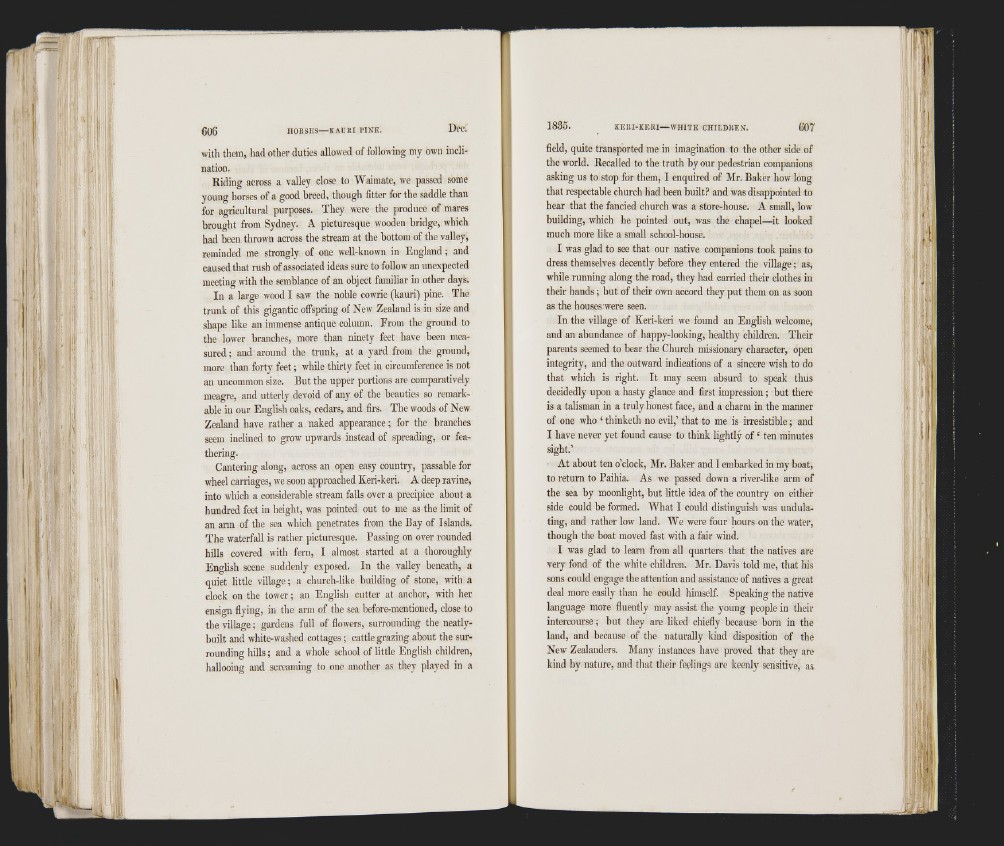
l | i f
i / 'Kf
M'si
i-..
at
with them, had other duties allowed of following my own inclination.
Riding across a valley close to Waimate, we passed some
young horses of a good breed, though fitter for the saddle than
for agricultural purposes. They were the produce of mares
brought from Sydney. A picturesque wooden bridge, which
had been thrown across the stream at the bottom of the valley,
reminded me strongly of one well-known in England ; and
caused that rush of associated ideas sure to follow an unexpected
meeting with the semblance of an object familiar in other days.
In a large wood I saw the noble cowrie (kauri) pine. The
trunk of this gigantic offspring of New Zealand is in size and
shape like an immense antique column. From the ground to
the lower branches, more than ninety feet have been measured
; and around the trunk, at a yard from the ground,
more than forty feet; while thirty feet in circumference is not
an uncommon size. But the upper portions are comparatively
meagre, and utterly devoid of any of the beauties so remarkable
in our English oaks, cedars, and firs. The woods of New
Zealand have rather a naked appearance; for the branches
seem inclined to grow upwards instead of spreading, or feathering.
Cantering along, across an open easy country, passable for
wheel carriages, we soon approached Keri-keri. A deep ravine,
into which a considerable stream falls over a precipice about a
hundred feet in height, was pointed out to me as the limit of
an arm of the sea which penetrates from the Bay of Islands.
The waterfall is rather picturesque. Passing on over rounded
hills covered with fern, I almost started at a thoroughly
English scene suddenly exposed. In the valley beneath, a
quiet little village; a church-like building of stone, with a
clock on the tower; an English cutter at anchor, with her
ensign flying, in the arm of the sea before-mentioned, close to
the village; gardens full of flowers, surrounding the neatly-
built and white-washed cottages ; cattle grazing about the surrounding
hills; and a whole school of little English children,
hallooing and screaming to one another as they played in a
field, quite transported me in imagination to the other side of
the world. Recalled to the truth by our pedestrian companions
asking us to stop for them, I enquired of Mr. Baker how long
that respectable church had been built.? and was disappointed to
hear that the fancied church was a store-house. A small, low
building, which he pointed out, was the chapel—^it looked
much more like a small school-house.
I was glad to see that our native companions took pains to
dress themselves decently before they entered the village; as,
while running along the road, they had carried their clothes in
their hands ; but of their own accord they put them on as soon
as the houses were seen.
In the village of Keri-keri we found an English welcome,
and an abundance of happy-looking, healthy children. Their
parents seemed to bear the Church missionary character, open
integrity, and the outward indications of a sincere wish to do
that which is right. It may seem absurd to speak thus
decidedly upon a hasty glance and first impression ; but there
is a talisman in a truly honest face, and a charm in the manner
of one who ‘ thinketh no evil,’ that to me is irresistible; and
I have never yet found cause to think lightly of ‘ ten minutes
sight.’
At about ten o’clock, Mr. Baker and I embarked in my boat,
to return to Paihia. As we passed down a river-like arm of
the sea by moonlight, but little idea of the country on either
side could be formed. What I could distinguish was undulating,
and rather low land. We were four hours on the water,
though the boat moved fast with a fair wind.
I was glad to learn from all quarters that the natives are
very fond of the white children. Mr. Davis told me, that his
sons could engage the attention and assistance of natives a great
deal more easily than he could himself. Speaking the native
language more fluently may assist the young people in their
intercourse; but they are liked chiefly because born in the
land, and because of the naturally kind disposition of the
New Zealanders. Many instances have proved that they are
kind by nature, and that their feelings are keenly sensitive, as
,1 1 1 1 )
I, tilt*
pt